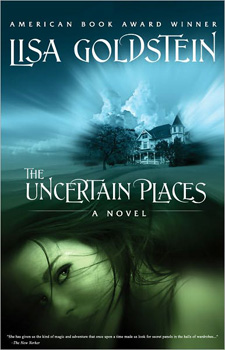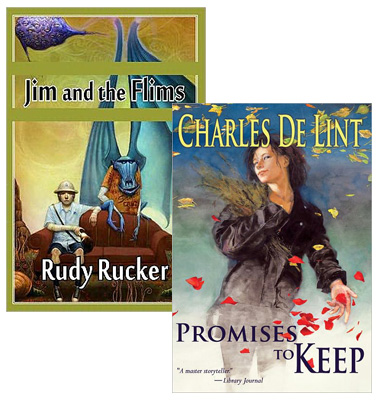Read This: The Uncertain Places (& Other Fantasies)
 I had a review in Shelf Awareness yesterday, in which I got to talk about Lisa Goldstein’s The Uncertain Places, which takes a young man in 1970s Berkeley and drops him into a modern fairy tale. Will Taylor falls in love with Livvy Feierabend, one of three sisters who live with their mother in a large house attached to a Napa vineyard. There’s some unusual behavior that spurs Will’s curiosity early on, but it’s when Livvy falls into a mysterious sleep that he becomes truly determined to find out what’s going on. With the help of his best friend, he uncovers a backstory that stretches over centuries, about a family that struck a bargain with supernatural creatures for fantastic wealth—a bargain that was almost recounted in the Grimm brothers’ compendium, except that it was “lost†before it could be published…
I had a review in Shelf Awareness yesterday, in which I got to talk about Lisa Goldstein’s The Uncertain Places, which takes a young man in 1970s Berkeley and drops him into a modern fairy tale. Will Taylor falls in love with Livvy Feierabend, one of three sisters who live with their mother in a large house attached to a Napa vineyard. There’s some unusual behavior that spurs Will’s curiosity early on, but it’s when Livvy falls into a mysterious sleep that he becomes truly determined to find out what’s going on. With the help of his best friend, he uncovers a backstory that stretches over centuries, about a family that struck a bargain with supernatural creatures for fantastic wealth—a bargain that was almost recounted in the Grimm brothers’ compendium, except that it was “lost†before it could be published…
You probably won’t be surprised to learn that Will is able to outsmart the fairies, but that’s actually only the first half of the story. He and the Feierabends will spend years looking over their shoulders, waiting for some form of supernatural payback, and when it comes, it spurs them into discovering a whole new layer of backstory along the way to completing their latest rescue mission. Goldstein does a fantastic job of making Will’s reactions to everything that unfolds around him plausible; as weird as the story gets, it stays grounded in the “real†world. Will’s obsession with breaking Livvy’s family curse—even if the rest of her family wants him to mind his own business—might strike some readers as unrealistic, but under the peculiar circumstances, it makes sense both for the storyline and for his personality. I was a huge fan of Goldstein’s brand of fantasy in the real world back in the 1980s, especially The Red Magician and The Dream Years, and I was excited as soon as I heard about this one. It lived up to my anticipation.
 I read two other fantasy books recently with the intention of writing about them for Shelf Awareness that ultimately aren’t winding up there, but which I still found awfully intriguing. Charles de Lint’s Promises to Keep was first published in a limited edition a few years ago; it’s a prequel to de Lint’s The Onion Girl and Widdershins, looking at an earlier period in the life of his protagonist, Jilly Coppercorn. In those novels, he’s outlined Jilly’s horrific past; this novella focuses on the time when she’s started the recovery process and is beginning to piece together a productive life for herself. An old friend reappears with an invitation to a concert at a club nobody else has ever heard about, and accepting that invitation brings her to a mysterious city where everybody seems to have the time and leisure to pursue their most profound ambitions. Yes, it’s the afterlife; yes, Jilly has to decide whether she really wants to stay. It’s a very well-told story—the city of the dead is a fantastic setting, filled with characters who appear to possess depth even beyond what we’re seeing in their exchanges with Jilly—but it’s also a very passive story. Jilly basically wanders around and thinks about what she should do—and since readers who are familiar with the character already know what will happen, there’s very little dramatic tension, and the resolution itself is subdued. A great book for fans, but maybe not the best introduction to de Lint’s particular brand of urban fantasy.
I read two other fantasy books recently with the intention of writing about them for Shelf Awareness that ultimately aren’t winding up there, but which I still found awfully intriguing. Charles de Lint’s Promises to Keep was first published in a limited edition a few years ago; it’s a prequel to de Lint’s The Onion Girl and Widdershins, looking at an earlier period in the life of his protagonist, Jilly Coppercorn. In those novels, he’s outlined Jilly’s horrific past; this novella focuses on the time when she’s started the recovery process and is beginning to piece together a productive life for herself. An old friend reappears with an invitation to a concert at a club nobody else has ever heard about, and accepting that invitation brings her to a mysterious city where everybody seems to have the time and leisure to pursue their most profound ambitions. Yes, it’s the afterlife; yes, Jilly has to decide whether she really wants to stay. It’s a very well-told story—the city of the dead is a fantastic setting, filled with characters who appear to possess depth even beyond what we’re seeing in their exchanges with Jilly—but it’s also a very passive story. Jilly basically wanders around and thinks about what she should do—and since readers who are familiar with the character already know what will happen, there’s very little dramatic tension, and the resolution itself is subdued. A great book for fans, but maybe not the best introduction to de Lint’s particular brand of urban fantasy.
Rudy Rucker’s transrealism,†which is basically writing about real life but using SF/fantasy tropes to get at psychological truths about the world as the author perceives it. In practice, though, the combination of deadpan voice and dream logic in a novel like Jim & the Flims can at times feel emotionally unrealistic, at least to the extent that readers anticipate a certain amount of mimetic polish in fiction.
Yes, we chafe when characters in novels behave too predictably, but we also find it disconcerting when they behave too randomly—perhaps even more so in fantasy, where we rely upon recognizable human psychology as a touchstone amidst the unfamiliar surroundings. (That holds true for non-human characters, too, as their “alien†behavior is often defined by contrast to “normative†human behavior.) Rucker’s fiction is often filled with fascinating ideas, but in this case, knowing that he’s going to be publishing a memoir later this year, I felt like maybe that might be a better introduction to him for the general audiences at Shelf Awareness. We’ll see in a few months if I’m right!
8 June 2011 | read this |

 Our Endless and Proper Work is my new book with Belt Publishing about starting (and sticking to) a productive writing practice.
Our Endless and Proper Work is my new book with Belt Publishing about starting (and sticking to) a productive writing practice. 
